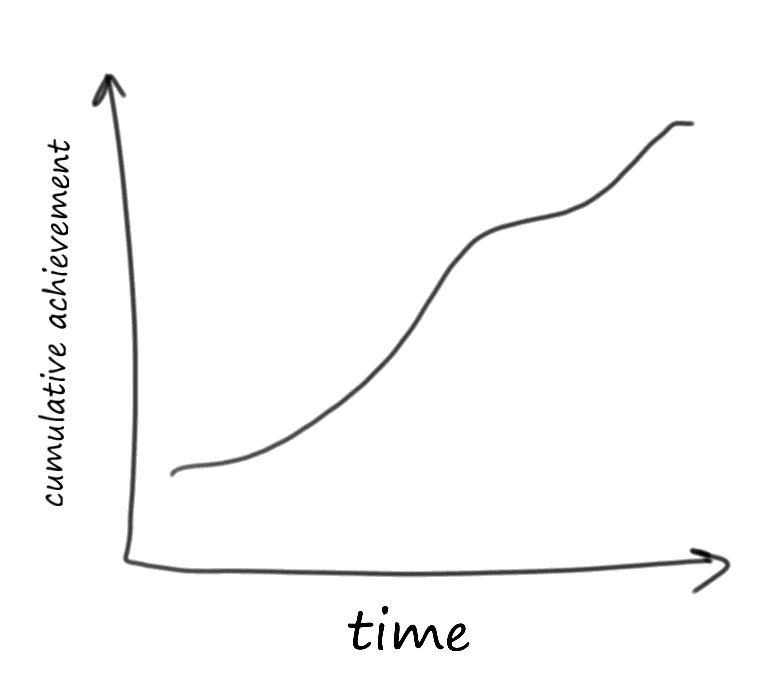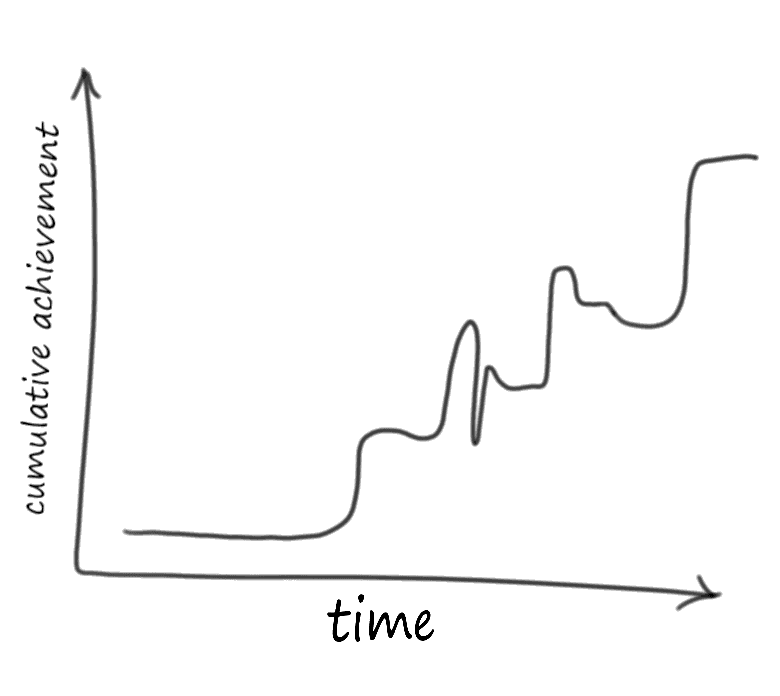To this date, schema-dts is the only side-project I have that achieved better-than-moderate success. It took several hours between the time I had the idea for schema-dts and when I had a reasonably working v0.1. I pulled an all-nighter—something that I hate doing and would never recommend—not out of sheer passion, but because:
- I knew how rare a moment of inspiration is, and
- I knew that if I went to sleep, I would never finish this project; there’s a graveyard of unfinished projects haunting me.
I had come to know that—especially for me—achievement is discontinuous.
This lesson—that achievement is discontinuous—was a tough pill for me to swallow and one I have not yet fully internalized.
For some of us, the first chapters of our lives can mislead us about the shape of progress. In school and university, progress can be a monotonous curve trending upwards, with regular progression in each unit, midterm, and semester. And the result is often tangible: a grade, degree, or placement.
Intellectually, I knew life wasn’t going to be like this. I understood there might not be a clear goal, and it is easy to wander a bit in between. But I hadn’t fully internalized that the shape of progress is not a monotonous curve but a scribble of vast lulls, unbelievable bursts, and many steps backward.

What I thought my cumulative achievements over time would feel like.

What my cumulative achievements over time actually feel like.
I often wonder what drives the shape of this curve for me. I think it is driven by two factors: creativity and flow. In my experience, both creativity and flow are unstable, chaotic states, with long, desolate lulls and magnificent bursts.
At work, flow (which sometimes I simply define as “the opposite of procrastination”) is usually enough to be productive. Creativity comes in handy once in a while.
But when I think about my own personal (career-y) accomplishments outside of my corporate life, creativity becomes another necessary condition on top of flow. Everything I might dream of putting out into the world—from a blog post or journal to an open-source project or game—requires some amount of creativity. That includes this essay, by the way, where I complain about creativity.
I don’t think the specific details and the extent to which my flow and creativity are bursty are universal by any means. Much of what I’m writing is a therapeutic, autobiographical exercise in journaling. But I think there’s something universal within the broad strokes of this pattern and some of the self-doubt cycles.
On flow
Though I would describe my states of flow as unpredictable and erratic, there’s something about it that I have to view as ritualistically predictable.
At work, I have days—sometimes weeks—of uninspired lulls and little motivation. I get very little meaningful work done, and like clockwork, I begin to have the same cycle of self-doubts: “What value am I bringing to work?” “How long can I get nothing done before I get fired?” “Will my colleagues continue to respect me, intellectually, if I get nothing done for months?” The self-doubts and anxiety don’t motivate me to reach flow but urge me to bury my head in the sand for a while.
Yet also like clockwork, flow comes in bursts. Sometimes, it is kind of forced: there’s a deadline for X, so X really needs to happen. Other times, it is serendipitous.
As I started recognizing cycle, I also began placing trust in these bursts of flow. When I notice myself feeling insecure about a lull in flow, I seek comfort in trusting that the flow will inevitably come. I have been wrong every time I have catastrophized a lull in flow, and a self-awareness of that has helped get me out of that cycle (sometimes).
On creativity
I rarely see myself as particularly creative. Granted, there are many different kinds of creativity, and I am certainly a creative problem solver. Still, my track record of generating ideas for a new problem that ought to be solved, or a new story that ought to be told, is virtually nonexistent.
Some of my friends in tech keep a little notebook of start-up or project ideas. I have tried to do the same at various points, but it wasn’t for me. Over time, I have come to see myself not as the person with the idea but as the person who makes an idea work if you come to me with one.
For the most part, that works out for me just fine. I don’t see myself as a serial entrepreneur, and I haven’t caught the ‘start-up bug’. Still, I enjoy having side projects. I enjoy the satisfaction of putting my work out in the world. I enjoy the _completion of work. There’s a kind of creativity associated with that.
Like flow, however, the windows of creativity are short and far between. So, when I happen to get an idea: a great essay to write, a novel and useful open source project, or (one day) an interesting game or product: I see in that burst of creativity a rare treasure.
It is a rare and precious occasion when my creativity and flow align. It happens a few times a year on a good year and might skip a year or two altogether once in a while. For a long time, I spent much energy and anxiety trying to figure out how to optimize these moments: make them line up, force myself to have more frequent windows of flow and creativity, etc. Recently, however, I have taken to enjoy the lulls in between and be satisfied in the moment. Instead, I have taken a more passive approach: see these moments as a gift, and capitalize on them as opportunities when they come organically.
I realize the passivity of this might turn off many folks, especially in the tech space—where a lot of us adopt this “can do” attitude. And I’d be lying if I said this is my attitude every day. But on days where I do—on days I embrace the lulls and place a passive trust in a coming burst—it does wonders to my outlook.
 Jenga. By Naveen Kumar.
Jenga. By Naveen Kumar.